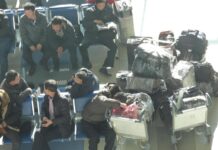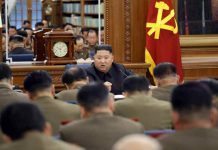North Korean authorities recently withdrew a Storm Corps (11th Corps) battalion guarding the border in Chagang Province, Daily NK has learned.
According to a Daily NK source in North Korea on Tuesday, the General Staff Department (GSD) issued the order to withdraw the battalion in mid-October. The battalion had been deployed to Chagang Province as part of efforts to seal the border following the outbreak of COVID-19 in 2020.
The battalion had been carrying out stakeouts and patrols along the China-North Korea border in Wiwon County, Chagang Province.
According to the source, the GSD issued the withdraw order for three reasons.
First, the GSD expressed the feeling that it no longer needed to keep the Storm Corps unit along the border. The GSD explained that the “previously elite, ideologically well-motivated unit” was “habitually engaging in anti-socialist, non-socialist and undisciplined behavior, no different from the border patrol.”
In fact, the GSD cited information about crimes committed by officers and enlisted personnel of the Storm Corps battalion.
Specifically, the Ministry of Social Security, Ministry of State Security and the “Unified Command on Non-socialist and Anti-socialist Behavior” had sent information to the military regarding infractions committed by soldiers in the unit. These infractions included wandering around the border “using martial skills they learned from the government” and, having gotten a “taste for money,” frequent border crossings into China “with gold, silver or meth strapped to their bodies.”
The GSD expressed concern that the Storm Corps unit had succumbed to ideological corruption and laxity after exposure to China’s bright lights during its nearly three years of deployment on the border.
In essence, the GSD’s withdraw order was aimed at preventing further damage to the unit’s image as an ideologically ironclad, elite force.
Second, the GSD pointed to strategic and tactical reasons for withdrawing the unit, which had evidently failed to perform its proper role for close to three years.
The GSD’s third reason for the withdrawal was the completion of high-voltage wires, four-ply electrified fences, and concrete walls along the stretch of border in Chagang Province the battalion had been guarding.
For these reasons, the GSD said there was no longer any need to keep the Storm Corps unit along the border. The battalion’s troops were returned their original posting ahead of the winter exercises, which start on Dec. 1.
LOCAL RESIDENTS WELCOME WITHDRAWAL
Many Chagang Province residents are welcoming the unexpected departure of the Storm Corps unit. In fact, locals are saying that given how Storm Corps troops withdrew “after preparing for their military discharges with the money they made from smuggling,” the force’s departure represents a win-win — “it’s good for them, and good for us.”
The source said some of the people who had lived off smuggling and trade prior to the closure of the border are worrying a bit less about their livelihoods following the withdrawal of the troops.
“Not just border residents but also border patrol troops were frustrated with the presence of the Storm Corps unit, but now they can breathe easier,” he said. “All the soldiers and civilians in the area are celebrating.”
Meanwhile, Chagang Province authorities plan to keep high-voltage electricity flowing to the stretch of border previously guarded by the Storm Corps unit through the end of the year.
This is because provincial authorities are concerned that they could face issues if defection or smuggling cases increase following the withdrawal of the Storm Corps battalion.
The Storm Corps battalion has been returned to its headquarters in Tokchon, South Pyongan Province, where its members are undergoing full ideological screenings and Ministry of State Security-led investigations.
The GSD has yet to order the withdrawal of Storm Corps personnel deployed to the border regions of Manpo, Chasong and Chunggang counties in Chagang Province, the source added.
Please direct any comments or questions about this article to dailynkenglish@uni-media.net.



















